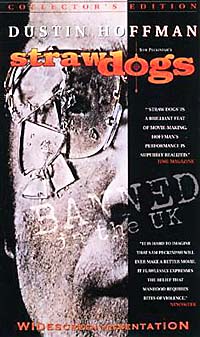https://www.austinchronicle.com/screens/1999-03-19/521607/
Scanlines
Straw Dogs
March 19, 1999, Screens
with Susan George, Dustin Hoffman, Peter Vaughan, David Warner
|
|
Rolling Thunder
D: John Flynn (1977)
with William Devane, James Best, Tommy Lee Jones, Linda Haynes
Rolling Thunder's Ex-Vietnam War POW Major Charles Rane (Devane) returns to a hero's welcome in San Antonio in the early Seventies. He is bestowed with a red Cadillac convertible, $2,500 in silver dollars, and accolades from all sides. Soon, however, he discovers that all is not as it seems; his wife strayed with a close friend during his years of confinement. Rane is so numbed and emotionally sealed off after his years of imprisonment that nothing seems to affect him much; he explains his endurance of torture at the hands of his captors by "learning to love it." He also finds that he has his own personal POW groupie, Linda (Haynes); her fascination with him is met with the same shoulder-shrugging blandness he shows toward everything else in what is left of his life. One day, Rane comes home to find a houseful of Texas white trash demanding his small fortune in silver dollars. Their efforts to beat him into telling the location of the money are for naught, so they jam his hand down a garbage disposal instead. When his wife and kid come home, the two gladly give up the money, but the robbers ruthlessly gun them down anyway. Flash-forward: Rane has himself fitted with a hook prosthesis (which he sharpens on a grinder), cuts down a couple of shotguns and points the scarlet Caddy land yacht south towards Nuevo Laredo, bent on revenge. With Linda in tow, he tracks the bad guys to Acuna and Juarez, where he hooks up with war buddy Johnny (Jones) for a final showdown. The otherwise routine revenge story of Rolling Thunder is given a measure of dimension and depth by Devane's performance and Paul Schrader's script. When not playing a Kennedy of some sort, William Devane often played a psychologically damaged character during the height of his career. He brings the script home with chillingly dead-on accuracy. The comparisons to Schrader scripts such as Taxi Driver are obvious and inevitable. Like Taxi Driver's Travis Bickle, Rane wears opaque sunglasses that allow no window into his dead soul. However, Bickle's soliloquies are missing; all the audience can see of Rane's character is what is on the surface, only what Rane wants others to see. He is simply a vengeful automaton, riddled with a cold, poisonous, implacable rage. The climactic scene with Johnny and Rane swooping down on a Juarez brothel like a pair of ruthless avenging angels surely rivals the end of Taxi Driver with its cathartic torrent of violence. Nearly all the interior shots have a dingy brownish look to them as the camera follows Rane through a string of seedy bars, motels, and whorehouses. You can nearly smell the burnt cordite and fresh blood in the air as they lend new meaning to the phrase "kicking asses and taking names." Best line: When Rane hooks up with Johnny and informs him of the bad guys' whereabouts, there is a long pause, then, "Well, I'll just get my things then." It is spoken about as casually as if he was being invited on an overnight camping trip.
Straw Dogs and Rolling Thunder: What a gritty, visceral, one-two gut-punch of pandering to the more primal impulses of the viewer. Make 'em a double feature some night when you're up for some guilty pleasures. -- Jerry Renshaw
Copyright © 2024 Austin Chronicle Corporation. All rights reserved.

